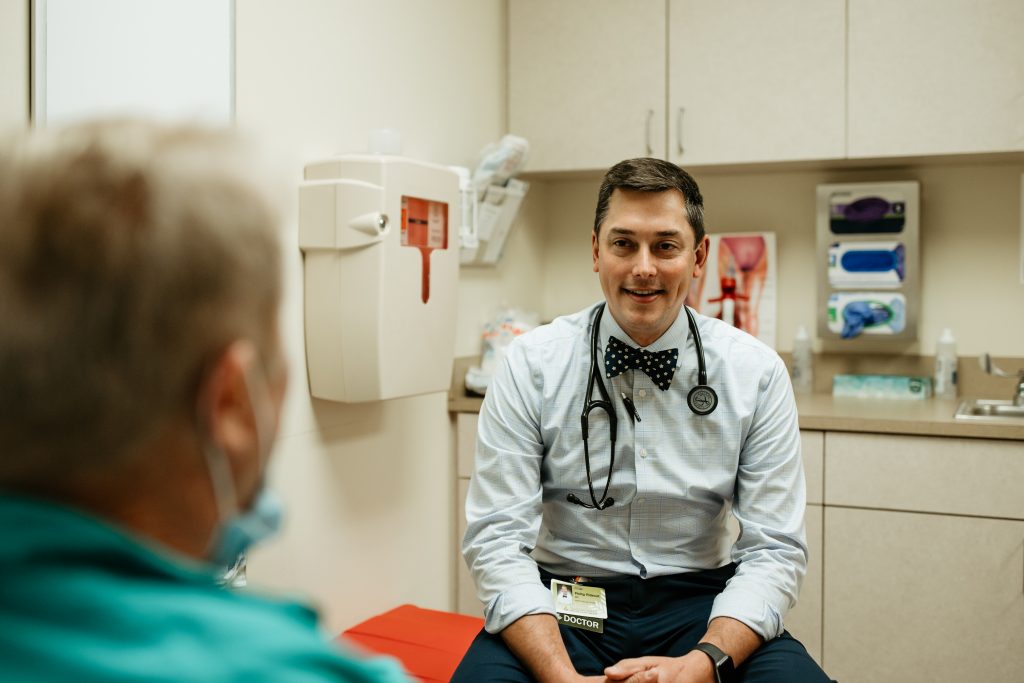Bulging veins in your legs can be more than a cosmetic issue – they may signal a more serious medical condition. While there are many forms of venous disease, including spider veins, varicose veins and swelling, they all result when the valves or walls of the blood vessels become weakened or diseased, allowing the blood to pool.
More than 30 million Americans suffer from varicose veins, or the more serious form of venous disease called chronic venous insufficiency (CVI) – yet the majority of cases remain undiagnosed and untreated.

FAQs
There are several factors that may contribute to varicose and spider veins including:
- Puberty
- Pregnancy
- Menopause
- Taking birth control
- Taking hormone replacement therapy
Aging, standing or working on your feet, obesity and leg injury may also worsen the condition.
Vein Conditions We Treat
At Georgia Heart Institute, our vascular surgeons and care team utilized advanced and effective treatment options for venous disease – all of which are designed to relieve symptoms, prevent further complications and improve the appearance of your legs.
Improper functioning of the vein valves in the leg, causing swelling, skin changes and sometimes discomfort.
Chronic venous insufficiency occurs when the veins in your leg don’t allow blood to flow back up to the heart normally, thus causing blood to pool in the legs.
Symptoms can include a heavy, tired feeling of the legs, swelling in legs or ankles, pain to the legs, discolored skin, visible varicose veins, itchiness and ulcers.
Possible risk factors include family history, age, sedentary lifestyle, prolonged standing, obesity or excess weight, current or previous pregnancies and smoking.
Your vascular care expert will review your medical history and symptoms and may order an ultrasound to scan your legs to determine if venous disease is present.
Wearing compression regularly can help with the symptoms of chronic venous insufficiency. Your provider may order procedures, such as a radiofrequency ablation, sclerotherapy or phlebectomy to help alleviate your symptoms.
Varicose veins are enlarged, twisted veins close to the surface of the skin. Any vein may become varicose, but legs and feet are the most affected areas.
Spider veins are small, damaged clusters of veins that are visible through the skin.
Spider veins are strongly related to genetics, but other causes include weight gain, pregnancy, sun damage, prolonged standing or sitting and trauma to the skin.
Spider veins are typically superficial and can cause one to feel self-conscious of their legs and/or feet.
Anyone who has a family history is at risk of developing spider veins, in addition to those who are obese, suffering from sun damage, or sit or stand for long periods.
Your vascular care expert will examine your legs and discuss the patient’s concerns to diagnose spider veins.
Spider veins are treated by single injections into each vein that cause the vein to collapse, forcing blood to reroute to healthier veins. This can improve the appearance of the leg.
Treatment Options
Georgia Heart Institute’s vascular surgeons and advanced practice providers specialize in all aspects of vein care and treatment – from tiny spider veins to large varicose veins to and chronic venous insufficiency. Using innovative, non-surgical and minimally-invasive techniques, we effectively treat these problems with minimal pain and recovery time. With the expertise of a highly-trained team, you’ll receive customized care that’s provided at the highest level, ensuring the best possible outcomes and experience.
Radiofrequency Ablation is a minimally invasive procedure to treat chronic venous insufficiency in your legs. This technique uses radiofrequency energy to heat up and damage the wall inside a vein. This process will close off the vein that is not working correctly.
Normally the veins have a one-way valve which directs blood towards the heart. However, problems with the valves, muscles or blood itself can allow blood to flow backward inside the vein. As blood pools within the vein, pressure builds, and the vessel wall weakens. This may lead to leg swelling, pain, discoloration or varicose veins.
This procedure normally takes about an hour.
Yes, one of our clinical staff members will call you 1-2 days prior to your procedure. We will call in your medication at that time.
No, due to the medication given to you by your doctor you will not be allowed to leave unless you have a driver.
Follow up after the procedure.
Your care team will schedule a follow-up visit 1-3 days after your procedure. During the visit, your care team will perform a venous duplex ultrasound to ensure the procedure was completely effective. Your doctor will also outline any other treatments you may need during this visit.
You should be able to return to all normal actives 1-2 days after the procedure. We advise you to avoid heavy lifting and squatting for 3-4 weeks.
Sclerotherapy is a minimally-invasive treatment for varicose and spider veins. During the procedure, your provider will treat small superficial veins with a single injection into each vein. The vein will collapse, forcing the blood to reroute to healthier veins and improving the appearance of the leg.
Why Choose Georgia Heart Institute?
We understand that every person is unique, and so is every treatment plan. Georgia Heart Institute’s vein specialists are experts in the most innovative procedures for treating venous disease. We offer both advanced minimally-invasive techniques and expertise in traditional surgery to ensure vascular care that’s distinctly yours.
If you’re ready to get started, please choose a provider below and schedule an appointment.

